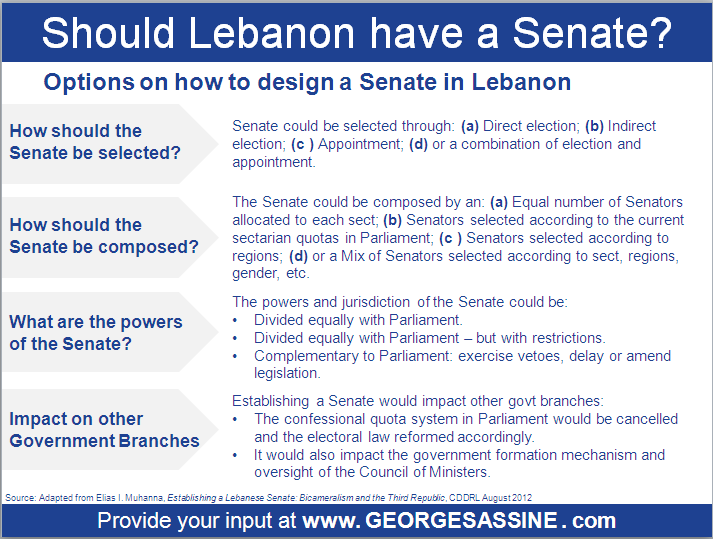Lebanon’s paralyzed governance system is leading many to rethink its political structure. Opinions vary on the best path forward including federalism, other forms of administrative decentralization, and many others.
One solution put forward by analysts is the establishment of a Senate as declared by the Taef Agreement. The premise is that the Senate would represent the different religious groups while Parliament would be open for political representation away from sectarian quotas. Advocates argue that this measure would reduce confessionalism in the Lebanese political system, while maintaining minorities’ rights.
Elias Muhanna, Assistant Professor at Brown University, recently published a paper raising the key questions around establishing a Senate in Lebanon, and explores the different options related to a Senate composition, possible methods of election, jurisdiction, and its relationship to other government bodies.
Key Points from Elias Muhanna’s Paper
The idea of a Senate is not new in Lebanese political history. Lebanon observed a Senate alongside Parliament for a year and half in 1926 and was abolished on October 17, 1927 – because it was viewed as “too expensive, too slow, and too weak”.
The Taef Agreement in 1989 called for a Senate but its vague formulation led to conflicting interpretations of the role it should play. The common assumption is that such a Senate would be headed by a Druze but no serious action has been taken towards its establishment.
Muhanna argues that the effectiveness of a Senate would depend on the way it is designed. He highlights the complex range of options available to set up a Senate in Lebanon – which I attempt to summarize in the table below.
According to Muhanna, the way a Senate is designed
“could potentially free the government from its legislative gridlock, ushering the possibility of issue-based politics and electoral laws that permit the emergence of liberal voices. [Or it] could prove to be a disastrous policy for Lebanon, one which would paralyze its government, adding new layers of costly bureaucracy and creating an additional arena for corrupt and reactionary politics.”
My Opinion
I personally doubt the success of establishing a Senate in the current Lebanese sociopolitical context. A top-down approach is unlikely to abolish confessionalism in Lebanon. Instead, a more effective method would require a longer term bottom-up approach allowing civil marriage, as well as reforming our education system as prerequisites to a more functional democratic model.
Muhanna’s paper is a must-read for all Lebanese. We must be aware of the pros and cons of a Senate system and consider it as a potential option moving forward.
However, before debating whether or not a Senate should be enforced in Lebanon, the immediate concerns of policy makers should be protecting Lebanon from a Syria spillover, reforming the electoral law, and appointing the members of the Oil and Gas commission.

